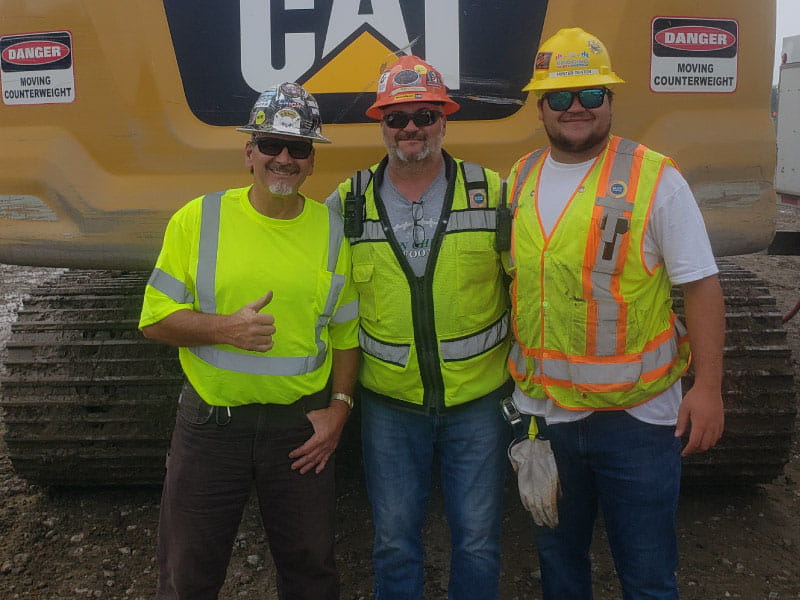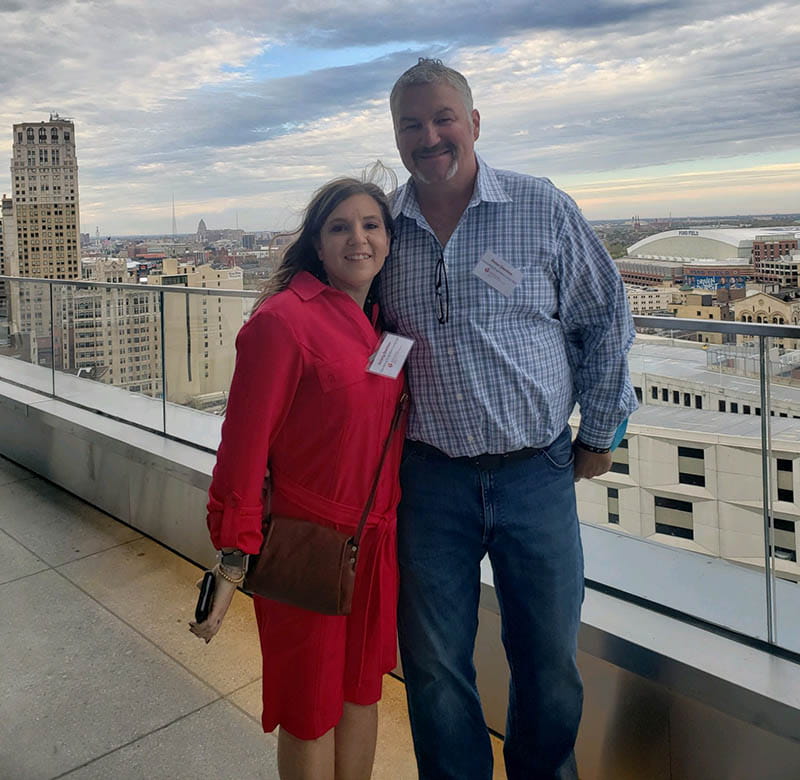Quick attention saved construction foreman during heart attack
By Diane Daniel, American Heart Association News

At 4:30 a.m. on a Monday morning last spring, Peter Denton got up in darkness, dressed and jumped in his pickup truck. The drive to his work site in Detroit took a little more than an hour.
As a construction foreman working on a new bridge connecting Detroit and Windsor, Ontario, Peter often clocked in six days a week, working up to 11 hours each shift.
The Friday before, he woke up with a runny nose, cough and chest pain. His wife, Kristy, insisted he go to urgent care. He was given a COVID-19 test, which was negative, and an electrocardiogram, which was normal. Nonetheless, the doctor told him there might be an underlying problem and said he should go straight to the emergency room if anything came up over the weekend.
All went well, even with Peter working an overnight shift, then spending Sunday clearing out fallen branches and brush around his home in Jackson, Michigan.
At noon Monday, he started his lunch break, eating a burger in the cab of his truck. With his window down, he chatted with a co-worker standing outside.
Suddenly, Peter felt nauseous. His vision blurred. He felt like he might pass out.
He remembered the doctor's advice. He also recalled there was a first aid station about a half mile away, on the job site.
"You need to take me to the medic," he told his friend. The man jumped into Peter's truck and started driving.
Halfway there, Peter felt like a knife was stabbing his heart over and over. He doubled over in pain.
An EKG explained what was happening.
"You're having a heart attack," a medic told him.
Peter waited for pain medicine to kick in and for an ambulance to arrive. Meanwhile, Kristy and Peter's father, Greg Denton Sr., who was working on the same job site, were notified.
As paramedics were taking Peter to the ambulance, his father rushed to his side. Trying to ease some of the tension, Greg joked, "We don't have time for this. We still have a lot of work to do here, son."
"It'll be all right, Dad," Peter answered.

At the hospital, doctors used two stents to open the blockages in his heart. Prompt action not only saved him, but it also put him on the road to a speedy recovery. He awoke without pain. Hours later, he was walking the halls of the hospital.
The next day, a cardiologist asked Peter about his lifestyle.
Did he smoke?
Did he chew tobacco?
Did he drink?
Peter answered every question with a "yes."
He readily acknowledges his lifestyle paved the way for a heart attack. At 45, he was 6-foot-1, 300-plus pounds. He'd been diagnosed with Type 2 diabetes.
He'd tried changing his habits before. The most recent try was a few years earlier, following the diabetes diagnosis. It only lasted until his medicine ran out. He didn't refill it and stopped seeing his doctor.
After his heart attack, Peter tried again.
He immediately stopped smoking and cut way back on drinking. He's still trying to quit chewing tobacco.
Eight months after his heart attack, he was down to 237 pounds. His goal is 200.
He was motivated by his three children, Gabriela Denton, 14; Hunter Denton, 20; and David Phelps, 27. And, of course, Kristy.
"After the heart attack, she reiterated how much I meant to her and the kids," Peter said. "And this time she decided to jump in with me and eat better and lose weight."
On previous attempts to eat healthier, he'd make salads while Kristy would cook dinner for herself and their children. Looking back, she realizes that left him feeling isolated and made it tougher for him to stick with his diet.
Now they're a team. They're following a diet that focuses on protein and vegetables. They've also eliminated fast food and eating out.
Kristy, who is 4-foot-11, has shed 20 pounds and weighs 119.

She bought Peter a bike trainer so he could ride his bicycle inside during the winter, and he plans to pedal throughout the year. He's also walking more on the job site instead of jumping into his truck for short trips.
His efforts seem to be working. In addition to losing weight, his doctor recently told him he no longer needs medication for diabetes.
Obesity affects 1 in 4 U.S. construction workers, according to the Hard Hats with Heart initiative from the American Heart Association that focuses on heart health in the construction industry. The same amount – 25% – use tobacco.
As someone who used to be in both groups, Peter is trying to help his colleagues beat those odds. He gently spreads the word about heart health and regular checkups.
"If talking about my experience saves one person or encourages someone to go to the doctor," Peter said, "I'd feel blessed."
Stories From the Heart chronicles the inspiring journeys of heart disease and stroke survivors, caregivers and advocates.
If you have questions or comments about this story, please email [email protected].





